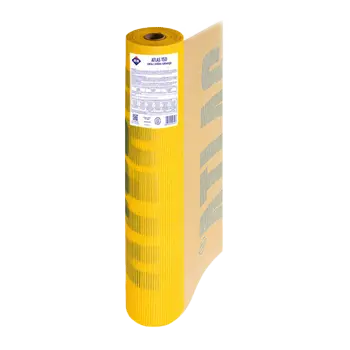What is fiberglass mesh?

Fiberglass mesh is a woven fabric made from thin strands of glass fibers. Builders and manufacturers use it to reinforce materials like concrete, plaster, stucco, and drywall. This mesh is lightweight, strong, and corrosion-resistant, which makes it suitable for both indoor and outdoor projects. It also provides excellent electrical insulation, making it ideal for areas that need protection from electrical interference.
Main Benefits
Fiberglass mesh offers several advantages compared to traditional reinforcement materials such as steel or wood.
- Lightweight: It’s easy to carry and install, which speeds up construction work.
- Durable: Despite its low weight, it provides excellent strength and resists cracking under stress.
- Weather-Resistant: The mesh does not rust, corrode, or degrade when exposed to moisture or chemicals.
- Electrical Protection: Its non-conductive nature makes it suitable for environments where electrical safety matters.
As a result, fiberglass mesh is one of the most versatile reinforcement materials available today.
Uses in Home Repair and Construction
In home improvement projects, fiberglass mesh adds strength and stability to various surfaces. Contractors often use it to reinforce walls, ceilings, and floors. It’s also great for patching cracks or holes in drywall or plaster.
When used under tiles or stucco, the mesh prevents cracking and improves surface adhesion. Because it’s flexible yet strong, it allows walls and ceilings to handle minor movements without damage.
Applications in Industrial Construction
Large-scale construction projects rely on fiberglass mesh to reinforce concrete walls, foundations, and bridges. The mesh helps distribute loads evenly, reducing stress on structural points.
Builders also use it as formwork support when pouring concrete slabs. This ensures a uniform surface and prevents cracks caused by shifting ground or uneven settling.
Automotive Applications
Fiberglass mesh is valuable in the automotive industry as well. Manufacturers use it to strengthen body panels, bumpers, and fenders without adding much weight.
Its flexibility allows components to absorb impacts without breaking. The mesh also appears in exhaust systems, where it supports pipes and reduces vibration from the engine.
Marine and Watercraft Uses
In the marine industry, fiberglass mesh reinforces boat hulls, decks, and trailers. Its corrosion resistance makes it perfect for saltwater environments.
Because it’s so light, it doesn’t affect the boat’s speed or fuel efficiency. At the same time, it offers the durability needed to withstand waves, impacts, and constant moisture.
Why Choose Fiberglass Mesh Over Traditional Materials
Unlike steel or wood, fiberglass mesh won’t rust or absorb water. It remains stable in heat, humidity, and extreme weather. This makes it a long-term solution for both structural and decorative projects.
It also reduces maintenance needs, lowers installation costs, and offers greater flexibility in design.
Conclusion
Fiberglass mesh combines strength, lightness, and resistance to create a reliable material for many industries — from home renovation to large-scale construction, automotive, and marine projects.
Its unique mix of durability and versatility makes it one of the best materials for reinforcement and surface protection. Whether you’re building, repairing, or designing, fiberglass mesh delivers long-lasting performance and value.

